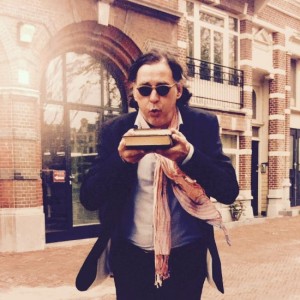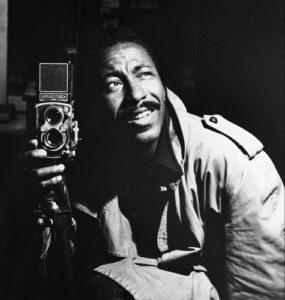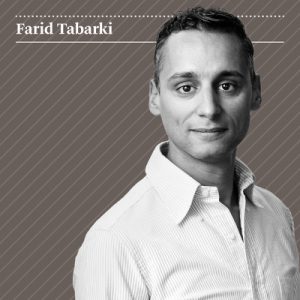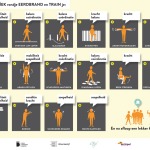Martha Gellhorn ~ A Furious Footnote In History
In a man’s world she was one of the few women. Whereas her fellow journalists reported the war as if keeping score, she concentrated on the reality behind the statistics. She reported the Spanish Civil War, the Second World War, Vietnam and Panama. What is it that drives her to these hotbeds ? An interview (conducted in 1991) with an angry old lady.
In 1983, and far into her seventies, Martha Gellhorn can contain her anger no longer. This time the destinations are Nicaragua and El Salvador. She still shudder at the memory.
‘In Central-America was the first time I’ve ever felt real fear. You couldn’t see or hear the danger approaching. Suddenly it was there.’ Back at home England’s Granta publishes a report of hers on an instance of torture. Described in minute detail from the victim’s own account, smuggled out to her under the greatest secrecy – via the Red Cross – by a representative of a human rights organization in San Salvador.
‘There are murders committed every day in El Salvador and it’s costing the American taxpayer enormous sums of money, for no reason. We support these murderers. This has to be stopped.’
Her war coverage, collected in the book The Face of War, and her own choice of her peacetime writings The View from the Ground, are the distillations of sixty years of anger and indignation at the state of affairs in the world in general and in her native United States in particular.
‘The reason I’ve been able to travel all over the world and talk to anybody I want, is that I appear to be harmless, unimportant. I don’t make notes, it’s just like talking to a stranger in the street. If you have a photographer with you or take notes, people notice straight away. They become aware of the situation and tense up, they become cautious, less natural. And, in any case, I wasn’t important enough to have a photographer along.’
In the television film Hemingway Martha Gellhorn is presented as a fanatical, blonde and ambitious journalist. Fanatical she has never been, blonde she has and if it’s ambitious to want to be heard, than she is ambitious. Before she met Hemingway, on holiday in Florida, she had already written a book about unemployment in America in the thirties, entitled The Trouble I’ve Seen. Later she published short stories, ten novels and account of the travels: Travels with Myself and Another.
She married Hemingway in 1940, but the marriage wasn’t to survive the Second World War.
‘I was married to that terrible man for four of five years and am punished daily for that. I don’t want to see his name in your article’, she decrees with a determined look in her eyes. At eighty-one Gellhorn still shows traces of being the beauty to whom Hemingway dedicated For Whom the Bell Tolls.
In the Spring of last year (1990) Bill Buford, Editor-in-Chief of Granta receives a telephone call from Martha Gellhorn. This time it’s Panama. Her report is rife with distrust of the official American version of events. Distrust also of the American and Panamanian authorities. Five thousand words, one for each of the estimated number of dead. The number of injured is unknown. ‘They remain unseen. The Panamanian authorities have admitted that in one night fifteen thousand families were made homeless.’ Read more
The Gordon Parks Foundation
Gordon Parks was one of the seminal figures of twentieth century photography. A humanitarian with a deep commitment to social justice, he left behind a body of work that documents many of the most important aspects of American culture from the early 1940s up until his death in 2006, with a focus on race relations, poverty, civil rights, and urban life. In addition, Parks was also a celebrated composer, author, and filmmaker who interacted with many of the most prominent people of his era – from politicians and artists to celebrities and athletes.
Born into poverty and segregation in Kansas in 1912, Parks was drawn to photography as a young man when he saw images of migrant workers published in a magazine. After buying a camera at a pawnshop, he taught himself how to use it and despite his lack of professional training, he found employment with the Farm Security Administration (FSA), which was then chronicling the nation’s social conditions. Parks quickly developed a style that would make him one of the most celebrated photographers of his age, allowing him to break the color line in professional photography while creating remarkably expressive images that consistently explored the social and economic impact of racism.
Go to: http://www.gordonparksfoundation.org/artist
Truth Or Dare ~ Mena-Region and Europe Towards A More Inclusive Dialogue
Tolhuistuin – IJpromenade 2 – 1031 KT Amsterdam ~ September 17 -2017, 14.00-21.30 h. – +31(0)20 7630650
To reserve tickets 7.50 € https://tolhuistuin.nl/agenda/
Do we citizens have a right to truth in post-truth societies? How much debate can we handle? What to do with ‘legitimacy claims’ and ‘the rule of law’ if increasingly they seem more part of the problem than being key to conflict resolution?
If you are interested in these pivotal issues of our time, come to the Tolhuistuin in Amsterdam on Sunday September 17 and participate in the Truth or Dare festival ‘beyond post-truth society’.
Truth or Dare welcomes the current battles about ‘fake news’ and ‘alternative facts’ as excellent opportunities to revisit and redesign our societies in Europe and the MENA region.
The event aims to offer a unique chance to challenge ourselves, discard useless narratives and develop new ones, and engage in fruitful dialogue with changemakers from around Europe and the Mena-region.
Truth or Dare is an exploration in five acts of the meaning of truth in present-day societies.
Taking our lead from the global debate about ‘the post-truth society’, we consider the fundamental crisis of the post truth age as a battle over legitimacy and the control over central institutions in society. Our conference is an attempt to create a safe space for critical contemplation and serious self-reflection. We deem such reflections crucial and a prerequisite in any fight for more equal and inclusive social and political dialogues. We focus our deliberations on the MENA region and Western Europe.
Prologue – 14.00-14.30 h.
Truth or Dare
Do citizens have a ‘right to truth?’ This thought-provoking speech will take us through the various meanings of ‘truth’ in our times. The speech is a prelude to an open dialogue with all participants that will address the following questions:
– Is a ‘common truth’, in this context defined as social consensus, necessary and a basic condition for peace and social stability?
– Is the discourse on truth and truth claims equally accessible to everyone?
– What are the consequences when institutions whose legitimacy derives from their ability to criticize, such as science and the rule of law, have become
contested themselves?
Keynote speaker: Adel Maïzi, Truth and Dignity Commission Tunisia
First act: Truth 14.30-15.30 h.
Is there life after truth?
Moderator: Markha Valenta, assistant professor at Radboud University Nijmegen
How are truth claims played out in present day societies and what are the minimum conditions needed to build (or rebuild) democratic institutions? These will be the two key subjects of this first Act. Modern institutions which arose from out of the need to hold societies together, such as media, science, the democratic rule of law and other forms of government derive their legitimacy from their ability to accommodate divergent ideologies and views: through systems of rules, procedures and standards they are supposed to build on a social consensus about values and methods. Now that this implicit agreement is undermined and considered of diminishing value, the question arises: What are the minimum conditions needed to build or rebuild well- functioning (democratic) institutions? Is ‘social consensus’ a basic condition to prevent polarization and social conflicts or does it suffice to just establish a set of transparent mechanisms to deal with diversity?
Speakers: Jonas Staal, Dutch visual artist; Samir Makdisi, American University of Beirut Read more
Truth or Dare: Tunisia’s case ~ Keynote Speech Adel Maïzi
With a keynote speech of Adel Maïzi from Tunisia’s Truth and Dignity commission, that touches on the painful processes of ‘truth telling’ and paves the way beyond the post-truth society.
Tunisia’s case
Those who in the current post- truth era wish to undertake a serious attempt to go beyond ‘the post-truth society’ and would like to revisit and redesign societies in Europe and the MENA region can’t ignore ‘the case of Tunisia’.
After a history of colonialism and dictatorships, in which ‘truth’ functioned as political instrument, control tool, construct of power or strategy to survive, the country is desperately seeking for ‘ the truth’ about its history and searching for a certain consensus about basic social and political values.
The deep wounds and scars of Tunisia’s post (or ‘before’?) – truth era are very present in today’s society.
Deep distrust, historically grown, among citizens, between citizens and political parties and toward state’s institutions represent the biggest obstacle to social pacification.
In 2014, Tunisia launched a Truth and Dignity commission, inspired by south- Africa amongst others, to uncover the truth of human rights abuses, preserve the memory for the nation and help reform the system.
Now that the mandate of the commission is nearing its end, it’s possible to take stock and see what has been achieved. In a series of hearings, the commission has opened a Pandora’s box of testimonies of victims of cruelty, torture, violence and rape. The first hearings were viewed by about a third of the population and gave rise to debate and concern in and outside the country. The testimony of the victims has shredded long-accepted official narratives and has exposed serious human right violations by the Tunisian authorities, human rights violations by authorities is still taboo in large parts of the world.
The first sings that the truth-telling is changing attitudes and opening a path to reconciliation have presented themselves.
Yet, the question whether the commission will fulfil her purpose remains open.
Tunisia’s Truth and Dignity has, so far, not been able to unshackling itself from the damaging divisions that have been characterising the country for decades. Politicians and media commentators rushed to criticize the hearings and undermine the work of the commission.
Officials who worked for the previous governments complained that the hearings are one -sided while citizens accused the commission of partiality and political motivations.
Why is the commission only focusing on RCD, the ruling party since 1956 and does Ennahda, the Islamist party who won the 2011 elections, remain unaffected? Who is responsible for the series of destabilizing terrorist attacks in the first years after the uprisings?
Is it really necessary to dig deeper and wouldn’t be better to turn the page?
If nothing else, Tunisia’s Truth and Dignity Commission has opened the debate about the significance of Truth in present day’s societies. Can societies do without a truth? Do citizens have a right to truth and what’s needed for more equal and inclusive working institutions?
It’s Just Not Relevant ~ Objective Truth
In 2015 Oxford Dictionaries chose the laughing face called ‘face with tears of joy’ (an emoji or ‘ideogram’ in internet communication) as its word of the year. The dictionary was not as upbeat this time around. The winner of 2016, ‘post-truth’, according to its definition relates to or denotes “circumstances in which objective facts are less influential in shaping public opinion than appeals to emotion and personal belief”. Doesn’t that call to mind Brexit and the US elections?
We are not talking here about a novel phenomenon. The Nation reminds us that the term ‘post-truth’ appeared in the magazine as early as 1992. Back then, Serbian-American author Steve Tesich was referring to the Iran-Contra affair of 1986, during which president of the US Reagan denied selling weapons to Iran in order to finance the Nicaraguan Contras.
According to Tesich “in a very fundamental way we, as a free people, have freely decided that we want to live in some post-truth world.“
Since then, Clinton has claimed not to have had sexual relations with that woman, Tony Blair has justified the war against Iraq by lying about Iraq’s supposed possession of weapons of mass destruction, and president Trump has denied climate change. It is not so much that objective truth does not exist, as indeed the postmodernists claim, because it does: it’s just not relevant.
You might expect such an absurd situation to occur only in unfree countries, such as the fictional country from George Orwell’s 1984, where citizens are forced to accept two truths through ‘double-think’. Or the Soviet Union, where, according to Alexei Yurchak, associate professor at Berkeley, hypernormalization was the norm: everyone was aware of the system’s failure, but for lack of a more hopeful outlook, both apparatchiks and citizens collectively pretended it was working normally. This period gave us the following proverb: “We pretend to work, and they pretend to pay us”.
Is the free west heading for a similar mock democracy, where the lying leader pretends to be right and the citizen pretends to vote for the politician he or she really wants? In this modern form of hypernormalization, Trump’s or Farage’s lies don’t serve to conceal the truth, but rather to strengthen prejudices.
The Netherlands also doesn’t seem to be able to combat lying politicians through fact-checking. According to professor Paul Frissen we must look for new political stories, all about “solidarity in a historically grounded future”. He is right: we are lacking in imagination. You don’t dismantle lies with facts, you dismantle them with vision.
Farid Tabarki is the founding director of Studio Zeitgeist
Harold Pinter ~ Art, Truth & Politics – Nobel Lecture 2005
In 1958 I wrote the following:
‘There are no hard distinctions between what is real and what is unreal, nor between what is true and what is false. A thing is not necessarily either true or false; it can be both true and false.’
I believe that these assertions still make sense and do still apply to the exploration of reality through art. So as a writer I stand by them but as a citizen I cannot. As a citizen I must ask: What is true? What is false?
Truth in drama is forever elusive. You never quite find it but the search for it is compulsive. The search is clearly what drives the endeavour. The search is your task. More often than not you stumble upon the truth in the dark, colliding with it or just glimpsing an image or a shape which seems to correspond to the truth, often without realising that you have done so. But the real truth is that there never is any such thing as one truth to be found in dramatic art. There are many. These truths challenge each other, recoil from each other, reflect each other, ignore each other, tease each other, are blind to each other. Sometimes you feel you have the truth of a moment in your hand, then it slips through your fingers and is lost.
I have often been asked how my plays come about. I cannot say. Nor can I ever sum up my plays, except to say that this is what happened. That is what they said. That is what they did.
Go to: http://www.nobelprize.org/pinter-lecture-e.html
See also: http://www.haroldpinter.org/home/index.shtml
- Page 2 of 3
- previous page
- 1
- 2
- 3
- next page





